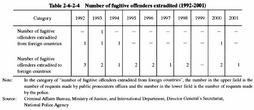| Previous Next Index Image Index Year Selection | |
|
|
2 Extradition of fugitive offenders (1) International cooperation for extradition Upon receiving a request for extradition from a foreign country, Japan may accept the request in accordance with the requirements and procedures provided in the Law of Extradition (Law No. 68 of 1953) under the guarantee of reciprocity, even in the case where Japan has not concluded an extradition treaty with the foreign country. Thus, Japan is able to provide guarantee of reciprocity for extradition to foreign countries as well as to receive fugitive offenders extradited from foreign countries. However, some countries require a concluded extradition treaty as a prerequisite for extradition. Among these countries, some have abolished policies that would hinder extradition in response to the current demands from the international community in which extradition is an important issue of international cooperation in criminal justice, whereas others conclude bilateral extradition treaties with many countries while maintaining such policies. Under the multilateral treaties that have recently been adopted, the Contracting States are required to criminalize certain acts as offenses in accordance with the difference between domestic systems, and to establish jurisdictions and apply extradition to such offenses so as to prevent the escape of offenders from criminal proceedings. These treaties also require the Contracting States either to extradite the offender to the country concerned or to refer the case to their competent authorities. Thus, these treaties aim to further promote international cooperation among the Contracting States.
In 1980, Japan and the United States concluded the Agreement on Extradition between Japan and the U.S.A. and Related Instruments Thereof. Japan also concluded with South Korea the Treaty on Extradition between Japan and the Republic of Korea in 2002. These treaties require both parties to mutually extradite offenders under certain requirements. Furthermore, these treaties allow the requested party to exercise its own discretion in extraditing its nationals, which is in principle prohibited under ordinary extradition treaties, thereby reinforcing cooperation between the Contracting parties. (2) Request from Japan to foreign countries for extradition of offenders When Japan makes an extradition request to a foreign country with which it has not concluded an extradition treaty, it complies with the requirements and procedures provided under the domestic laws of the foreign country. In order to arrest the fugitive offender, Japan makes an extradition request to the foreign country through diplomatic channels. Either the public prosecutors office or the police, etc. may make such a request, and the request shall be sent to the concerned foreign country via the Ministry of Foreign Affairs of Japan. Furthermore, it may be possible to arrest a fugitive offender in the case where the offender voluntarily returns to Japan or is deported from the foreign country.
Table 2-6-2-4 shows the number of fugitive offenders extradited from foreign countries to Japan over the last 10 years. 1 offender in 1 case was extradited from Italy in 1992, 2 offenders in 2 cases from the United States in 1993, 1 offender in 1 case from Brazil in 1994, and 1 offender in 1 case from Thailand in 2000 (Source: Criminal Affairs Bureau, Ministry of Justice, and International Department, Director-General's Secretariat, National Police Agency). (3) Request from foreign countries to Japan for extradition of offenders Table 2-6-2-4 also shows the number of fugitive offenders extradited from Japan to foreign countries over the last 10 years. In 2001, Japan received 1 extradition request for 1 offender in 1 case from the United States and extradited the requested offender (Source: Criminal Affairs Bureau, Ministry of Justice).
Table 2-6-2-4 Number of fugitive offenders extradited (1992-2001) |
